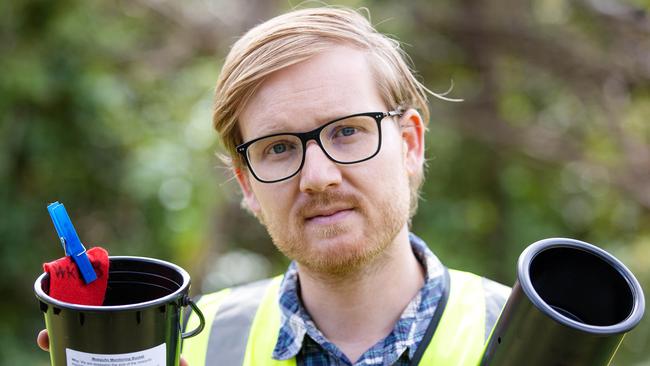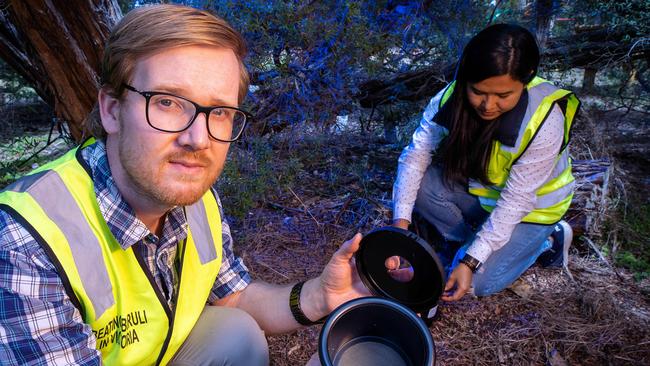Scientists set mozzie traps to keep flesh-eating disease at bay
Multiple cases of the rare flesh-eating buruli ulcer have been found in these suburbs in Melbourne’s northwest.
Victoria
Don't miss out on the headlines from Victoria. Followed categories will be added to My News.
Mosquitoes are a growing threat for Melbourne’s inner suburbs as health authorities grapple with increased breeding and the spread of a nasty disease.
Officials are concerned by a spike in cases of the flesh-eating buruli ulcer in suburbs such as Essendon, Moonee Ponds and Brunswick West.
The Moreland Council area recorded 21 cases of the infection last year after only a single case in 2020.
Buruli ulcer infections often start as painless swellings but can cause disability and permanent disfigurement due to skin and tissue damage.
Scientists are testing mosquito control measures to reduce infections, as it is believed the insects carry the disease between possums and humans.
A joint initiative led by Melbourne University’s Doherty Institute began on Friday on the Mornington Peninsula, where residents have the highest risk in the state of contracting the infection.

Melbourne University microbiologist Tim Stinear said the spread of the infection in the inner suburbs showed the need for an intervention.
“This disease is moving through the suburbs of Melbourne and is slowly increasing. We’re invested in trying to stop its spread,” he said.
“It doesn’t have the same urgency as Covid, it’s not spreading anywhere near as quickly, obviously, but it is nonetheless spreading and the spike in cases in Essendon and inner suburbs last year just highlight that potential.”
Professor Stinear said the researchers were confident mosquitoes were responsible for spreading the disease.
Volunteers on the Mornington Peninsula will receive non-toxic mosquito traps called Gravitraps, which have been used worldwide to reduce mosquito numbers.
Members of the Beating ¬Buruli research team will help people spot mosquito breeding areas on their properties and place the traps.
“They are very simple traps – little black cylinders that have a water source in them,” researcher Peter Mee said.
“Pregnant female mosquitoes are attracted to them, but they will get stuck inside on a sticky card, and they and their eggs are effectively removed from the population.
“A single female can lay hundreds off eggs so taking them out has a real impact on the population in an environmentally friendly, non-toxic way.”

Original plans for the mosquito control trial in 2019 were shelved following community backlash to proposed use of a pesticide.
Mornington Peninsula Shire councillor David Gill, who is a native bee enthusiast, said the health authorities’ response to the complaints had been a “good outcome”.
“It’s good to hear they have followed through after lots of good communication with the local community,” Mr Gill said.
“We wanted them to look at other controls without having to spray, because the issue was do you spray widely and affect bees and all insects?”
Prof Stinear said the local community had “legitimate concerns” at the time.
“The community wanted a non-spraying approach to address the question of whether controlling mozzies would stop Buruli, so we responded to that with a different design,” he said.
The trial follows an advisory issued on Monday by Chief Health Officer Brett Sutton warning Victorians to be on alert for mosquito-borne diseases including Ross River virus and Barmah Forest virus.
The advisory warned mosquito breeding rates had increased due to heavy rain in late January, particularly in Gippsland and coastal areas in the southwest.


